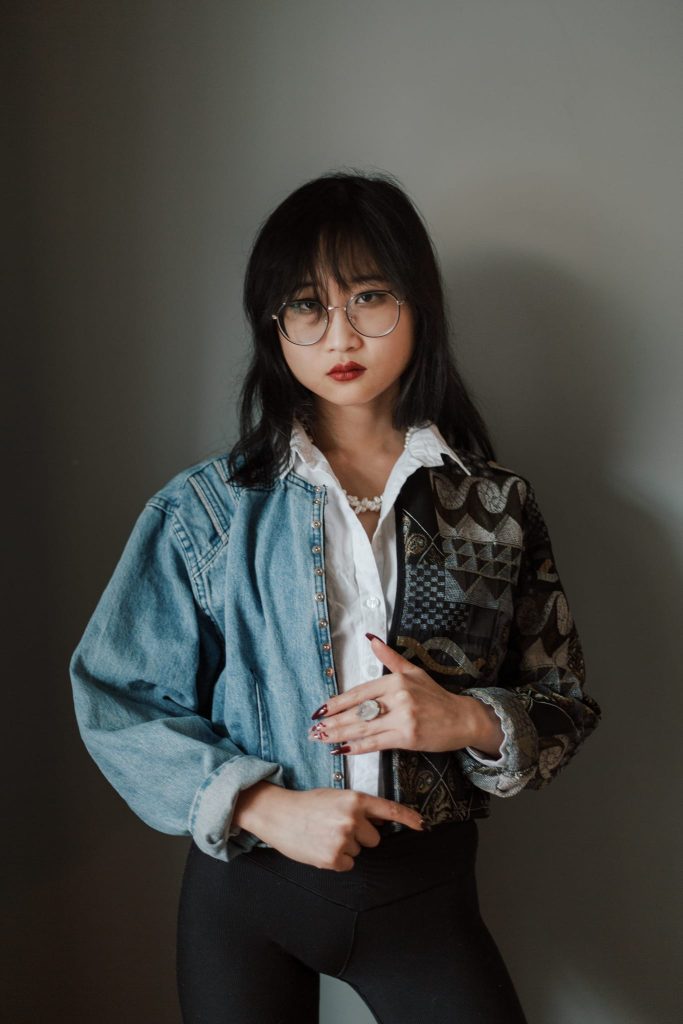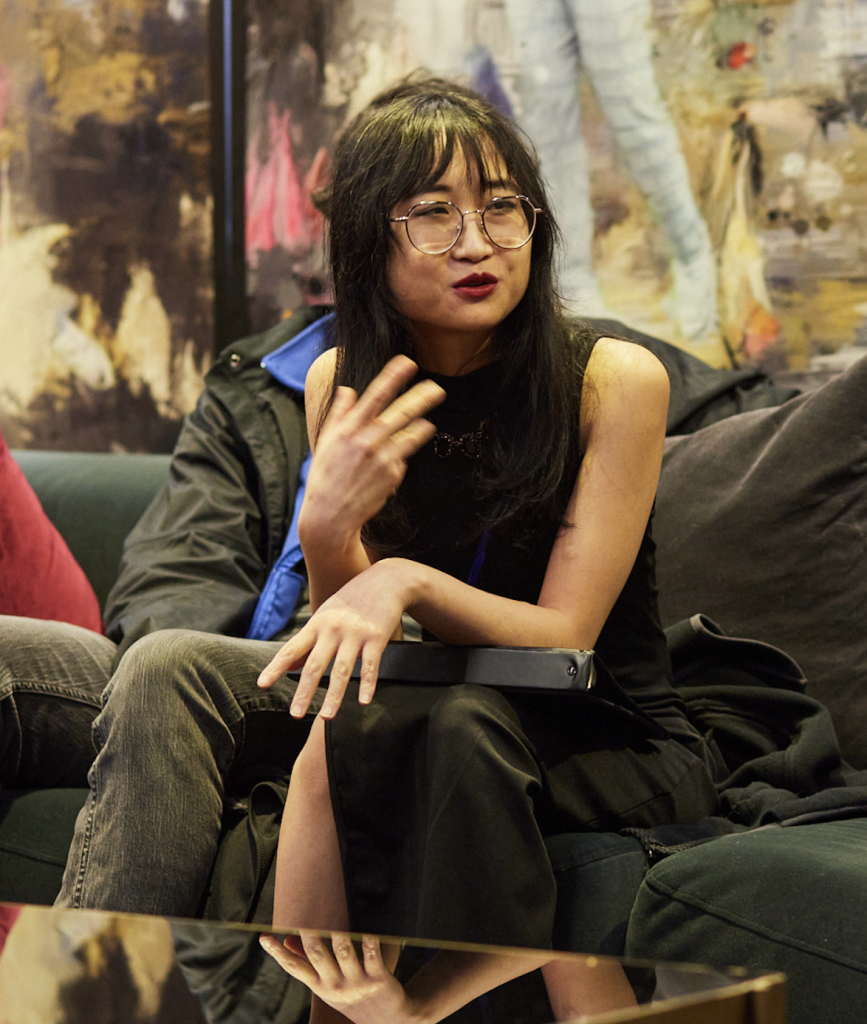
I’ve already mentioned the short story contest “Planète, Mon Amour” in my interviews with Coltrane Seesequasis and Nell Pfeiffer ahead of the Blue Metropolis. However, I have yet to discuss the students who each won a $1000 grant and the chance for their story to be recorded in podcast form. Through this contest, the Blue Metropolis allows students to experiment with writing ecological fiction, with the only guidelines being to include romance and to address climate change in their pieces. Fostering creativity and focusing on the importance of taking care of our planet are crucial in our current political climate.
While Kalya Nzesseu took home the French prize with “Quand les eaux se taisent,” Nancy He, a graduate student from McGill currently studying food science and agricultural chemistry, wrote the English prize-winning piece “Ophelia”. This gothic, fantastical piece follows Tristan, a young man in a dying fishing village, who encounters the mysterious Ophelia, an inhumanly stunning woman who emerges from the sea and uses a mysterious ability to help them catch more fish than they have in the last several decades. However, the balance between nature and man cannot be so easily fixed, and Tristan faces difficult decisions regarding Ophelia and keeping his village alive. During Seesequasis’ interview on April 26th, Nancy He read an excerpt from her story aloud, which further piqued my interest. Nancy He was happy to walk me through her experience with writing the short story, how it feels to win, and the Blue Metropolis festival in general.
ImaginAtlas: How did you hear about the short story contest? Have you written short stories before?
Nancy He: I saw the ad for the contest while I was scrolling through Facebook, actually! Turns out sometimes procrastination can lead to good things. I really haven’t tried writing fiction in a long, long while—maybe a decade or more—and writing short stories is something very new to me. But I recently got back into reading and writing fanfiction, which reignited in me a desire to write creatively.
ImaginAtlas: How did you develop the plot for your short story? Did anything specific inspire you?
He: I come up with story plots based around the landscape first, and go from there. I grew up in the Maritimes, so the ocean has always been a big part of my childhood, my memories, and also inevitably my writing. In general, I am a big fan of weaving symbolism in my stories. So I tried to do that here, with Ophelia representing the untamed femininity of nature, and Tristan representing the oppressive and obsessive side of [humankind]. It began with that kind of idea, and built from there, usually while I was daydreaming on bus rides.
ImaginAtlas: “Ophelia” is a compelling piece with some fantastical elements. What made you decide to write a speculative fiction story to explore climate change?
He: Speculative fiction and fantasy have always drawn me in, as I love the room for creativity that such realms afford. Big topics, such as climate change and humanity’s role in it, can be difficult to fully explain and understand. They are such complex issues that they can feel too abstract to take in fully. Using speculative fiction allows us to condense such things in the form of a metaphor—the ocean itself does not have a voice, but in the realm of speculative fiction, we can give it one. We can assign roles as if in a play, simplifying the message to its core and in a manner which is easy to empathize with and remember.
I had actually written a few pieces for this specific contest, and played around with some different settings—I’d [submitted] a futuristic science-fiction piece as well. In the end, this one resonated the most with me.
ImaginAtlas: What is the writing process like for you?
He: I am a relatively inexperienced writer, so perhaps my ‘methods’ are rather rudimentary. I brainstorm first. I often have a story kind of going in my head already, then jot down the outline. I’ll visualize different snippets of dialogue, scenery, and prose, and note those down too, often on my phone—you never know when inspiration will strike!
I wouldn’t say it’s easy, as I am often quite critical of my work, and I spend a lot of time worrying rather than writing. I’m still trying to get over that perfectionistic mindset—it’s better to put words on a page and fix it later than to spend hours fretting over whether it will be perfect.
ImaginAtlas: How does it feel to have your work recorded so people can listen to it online?
He: It was my first time recording a podcast. It was a good experience and I’d love to do it again! I dreamt of becoming a voice actor at some point in my youth, so in a way, a small aspect of that was fulfilled. I’m glad that people can now listen to my story as well, as having it in audio form definitely makes it more accessible to a wider audience.

ImaginAtlas: What was it like to read an excerpt from your story to an audience at the Blue Metropolis, and what were some of the highlights of the festival for you in general?
He: The festival was very well organized, and I was impressed with all the presenters, events, and workshops, though I unfortunately did not get an opportunity to take full advantage of my access to them due to my schedule.
The reading was an enjoyable experience, and brought me back to my middle-school days of doing oratorical competitions. I really enjoyed listening to Coltrane Seesequasis speaking about his book, and having the opportunity to talk to him about his writing processes and overall approach and experiences as an author; I’ve never really had the opportunity to interact with authors, so this was very eye-opening for me.
ImaginAtlas: Would you submit to another short story contest like this one?
He: Yes, why not? I enjoy writing for fun, and I hope to continue doing so and having a chance to share it with a wider audience would be a welcome opportunity.
ImaginAtlas: If someone wants to read more of your work, where can they find you?
He: In terms of creative writing, most of what I write these days is rather niche fanfiction, so probably better kept separate from my professional work. I also publish some poetry on my social media. Otherwise, I am a scientific author! I have two papers published to date.
Regardless of what He pursues next, her story is beautiful, and it was good to meet her and learn about what such an event is like from a participant’s perspective.
